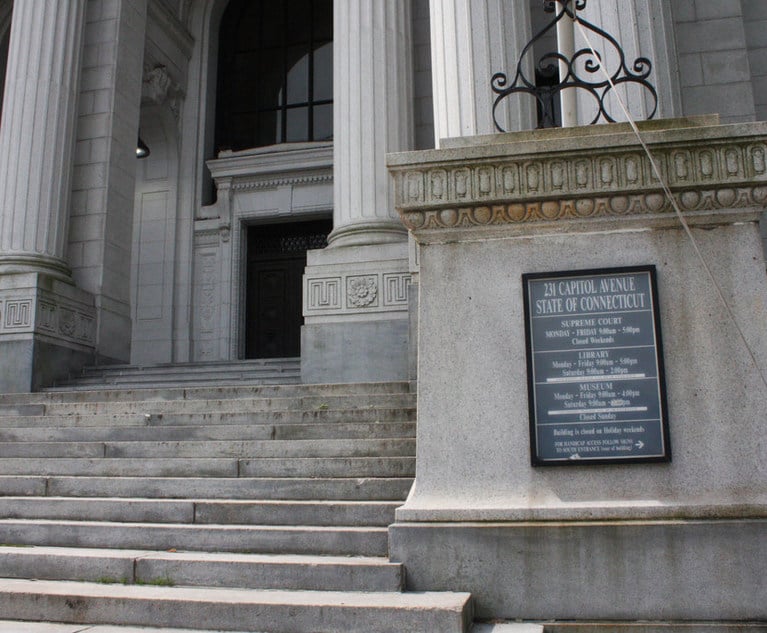 Connecticut Supreme Courthouse. Photo: Wikicommons
Connecticut Supreme Courthouse. Photo: Wikicommons Determining Reasonable Accommodation for Pro Se Litigants
Idlibi v. Hartford Courant Company is instructive on how a self-represented party should be treated in court.
October 14, 2024 at 05:23 PM
4 minute read
CommentaryThe recently decided case of Idlibi v. Hartford Courant Company (SC 20800) is a law school class on how a self-represented party should be treated in Connecticut's courts. Both the decision, by Justice McDonald, and the dissent, by Justices Ecker and D'Auria, are exhaustive, going into excruciating detail on the rights and obligations of the party who chooses to represent him or herself and how the courts should deal with that party. Given that both parts of the decision are so thorough and so well-presented, the result is that from a precedential standpoint, the argument is still out there, largely undecided, although the decision itself has obviously been made by a majority of the court.
The facts are not complicated. A pediatric dentist is accused of malpractice for work done on a small child without the parent's permission. Two articles in the Hartford Courant relate the facts and the decisions of the Department of Public Health and the State Dental Commission, fining the dentist and putting his Connecticut license to practice as a dentist on probation. Dr. Idlibi then brought suit against the Hartford Courant for defamation, claiming that the stories unfairly represented the facts of the case. The matter proceeded quickly to summary judgment, and then to appeal, where the Appellate Court upheld the decision in favor of the newspaper, finding that the articles were substantially true or subject to the fair report privilege. What was missing was a claim, poorly presented by the plaintiff, that a photograph that accompanied both articles was also defamatory, or, in the plaintiff's words, was misleading and brought with malice.
NOT FOR REPRINT
© 2025 ALM Global, LLC, All Rights Reserved. Request academic re-use from www.copyright.com. All other uses, submit a request to [email protected]. For more information visit Asset & Logo Licensing.
You Might Like
View All
Coerced Confessions and the Burden of Proof Beyond Reasonable Doubt


35 Years After CT's Affordable Housing Act, Progress Remains a Struggle
4 minute readTrending Stories
- 1Rejuvenation of a Sharp Employer Non-Compete Tool: Delaware Supreme Court Reinvigorates the Employee Choice Doctrine
- 2Mastering Litigation in New York’s Commercial Division Part V, Leave It to the Experts: Expert Discovery in the New York Commercial Division
- 3GOP-Led SEC Tightens Control Over Enforcement Investigations, Lawyers Say
- 4Transgender Care Fight Targets More Adults as Georgia, Other States Weigh Laws
- 5Roundup Special Master's Report Recommends Lead Counsel Get $0 in Common Benefit Fees
Who Got The Work
J. Brugh Lower of Gibbons has entered an appearance for industrial equipment supplier Devco Corporation in a pending trademark infringement lawsuit. The suit, accusing the defendant of selling knock-off Graco products, was filed Dec. 18 in New Jersey District Court by Rivkin Radler on behalf of Graco Inc. and Graco Minnesota. The case, assigned to U.S. District Judge Zahid N. Quraishi, is 3:24-cv-11294, Graco Inc. et al v. Devco Corporation.
Who Got The Work
Rebecca Maller-Stein and Kent A. Yalowitz of Arnold & Porter Kaye Scholer have entered their appearances for Hanaco Venture Capital and its executives, Lior Prosor and David Frankel, in a pending securities lawsuit. The action, filed on Dec. 24 in New York Southern District Court by Zell, Aron & Co. on behalf of Goldeneye Advisors, accuses the defendants of negligently and fraudulently managing the plaintiff's $1 million investment. The case, assigned to U.S. District Judge Vernon S. Broderick, is 1:24-cv-09918, Goldeneye Advisors, LLC v. Hanaco Venture Capital, Ltd. et al.
Who Got The Work
Attorneys from A&O Shearman has stepped in as defense counsel for Toronto-Dominion Bank and other defendants in a pending securities class action. The suit, filed Dec. 11 in New York Southern District Court by Bleichmar Fonti & Auld, accuses the defendants of concealing the bank's 'pervasive' deficiencies in regards to its compliance with the Bank Secrecy Act and the quality of its anti-money laundering controls. The case, assigned to U.S. District Judge Arun Subramanian, is 1:24-cv-09445, Gonzalez v. The Toronto-Dominion Bank et al.
Who Got The Work
Crown Castle International, a Pennsylvania company providing shared communications infrastructure, has turned to Luke D. Wolf of Gordon Rees Scully Mansukhani to fend off a pending breach-of-contract lawsuit. The court action, filed Nov. 25 in Michigan Eastern District Court by Hooper Hathaway PC on behalf of The Town Residences LLC, accuses Crown Castle of failing to transfer approximately $30,000 in utility payments from T-Mobile in breach of a roof-top lease and assignment agreement. The case, assigned to U.S. District Judge Susan K. Declercq, is 2:24-cv-13131, The Town Residences LLC v. T-Mobile US, Inc. et al.
Who Got The Work
Wilfred P. Coronato and Daniel M. Schwartz of McCarter & English have stepped in as defense counsel to Electrolux Home Products Inc. in a pending product liability lawsuit. The court action, filed Nov. 26 in New York Eastern District Court by Poulos Lopiccolo PC and Nagel Rice LLP on behalf of David Stern, alleges that the defendant's refrigerators’ drawers and shelving repeatedly break and fall apart within months after purchase. The case, assigned to U.S. District Judge Joan M. Azrack, is 2:24-cv-08204, Stern v. Electrolux Home Products, Inc.
Featured Firms
Law Offices of Gary Martin Hays & Associates, P.C.
(470) 294-1674
Law Offices of Mark E. Salomone
(857) 444-6468
Smith & Hassler
(713) 739-1250











